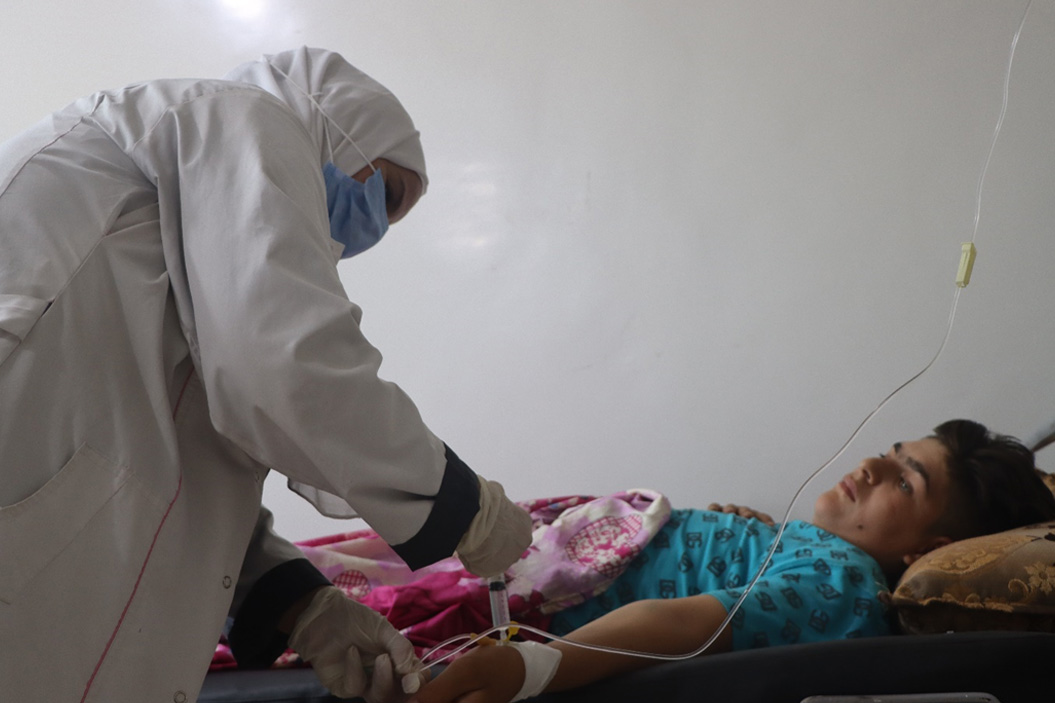 Ali carries his 8-year-old son Abdelkarim through the crowded corridor of Menbij National Hospital after the boy received urgent care for a fracture. Photo credit: WHO
Ali carries his 8-year-old son Abdelkarim through the crowded corridor of Menbij National Hospital after the boy received urgent care for a fracture. Photo credit: WHO
17 September 2025, Aleppo, Syrian Arab Republic – When 8-year-old Abdelkarim Naasan fell while playing in his neighbourhood in Menbij, the pain in his leg left him unable to walk. His father carried him to Menbij National Hospital, the only hospital in the district. There, doctors quickly diagnosed a fracture and treated him with a cast. “The care was immediate and reassuring,” his father recalled. “We left the hospital confident that he would heal.”
For thousands of families in Menbij, a city in the north east of Aleppo Governorate, this hospital is the only place to turn for both emergencies and routine care. From trauma surgery to laboratory tests and blood transfusions, it provides essential services in an area where health care access is scarce.
 Dr Maqsoud Shankan, head of the laboratory at Menbij National Hospital examines test samples to ensure accurate diagnosis and treatment for patients. Photo credit: WHOWith funding from the European Union, through its Civil Protection and Humanitarian Aid Operations (ECHO), WHO and its partner Al-Ameen are ensuring that Menbij National Hospital remains open and equipped to serve people in need. The hospital provides medical consultations, emergency obstetric and dialysis services, as well as trauma and intensive care. In addition, WHO enhanced the hospital’s trauma capacity through the provision of mass casualty training for its staff.
Dr Maqsoud Shankan, head of the laboratory at Menbij National Hospital examines test samples to ensure accurate diagnosis and treatment for patients. Photo credit: WHOWith funding from the European Union, through its Civil Protection and Humanitarian Aid Operations (ECHO), WHO and its partner Al-Ameen are ensuring that Menbij National Hospital remains open and equipped to serve people in need. The hospital provides medical consultations, emergency obstetric and dialysis services, as well as trauma and intensive care. In addition, WHO enhanced the hospital’s trauma capacity through the provision of mass casualty training for its staff.
In recent months, more than 23000 people – including displaced families and host communities – received care through these facilities. The increase in patient visits reflects growing trust in the health system. Specialist services, including paediatrics and internal medicine, are seeing especially high demand.
Health workers emphasize how vital this support has been. Dr Maqsoud Shankan, head of the hospital’s laboratory, explained, “Every accurate test helps doctors give the right treatment. Without these services, patients would have to travel long distances or go without care.”
 Laboratory technician Abdel Salam Khalaf collects blood from a donor at Menbij National Hospital. Photo credit: WHOAt the blood bank, 28-year-old technician Abdel Salam Khalaf manages donations and urgent transfusions. “In an emergency, we cannot afford delays. Having the right equipment and supplies here in Menbij makes the difference between life and death.”
Laboratory technician Abdel Salam Khalaf collects blood from a donor at Menbij National Hospital. Photo credit: WHOAt the blood bank, 28-year-old technician Abdel Salam Khalaf manages donations and urgent transfusions. “In an emergency, we cannot afford delays. Having the right equipment and supplies here in Menbij makes the difference between life and death.”
To ensure the safety of patients and health workers, the hospital has also improved infection prevention and control. This includes practical measures such as providing staff with protective equipment, ensuring proper waste disposal, and setting up strict hand hygiene and sterilization routines. These steps reduce the risk of infections spreading within the hospital and give families greater confidence that they can seek care safely.
 Abdelhadi Mousa receives post-operative care at Menbij National Hospital after undergoing gallbladder surgery. Photo credit: WHOFor patients like 22-year-old Abdelhadi Mousa, who underwent gallbladder surgery at Menbij National Hospital, this investment is life-changing. “I lived with pain for so long,” he said. “Now, after the operation, I can begin again.”
Abdelhadi Mousa receives post-operative care at Menbij National Hospital after undergoing gallbladder surgery. Photo credit: WHOFor patients like 22-year-old Abdelhadi Mousa, who underwent gallbladder surgery at Menbij National Hospital, this investment is life-changing. “I lived with pain for so long,” he said. “Now, after the operation, I can begin again.”
In a district where health facilities are few and challenges remain high, Menbij National Hospital stands as a lifeline. Continued support from the European Union ensures that these services remain available, sustaining care today while laying the foundation for stronger, safer health systems in the future.








